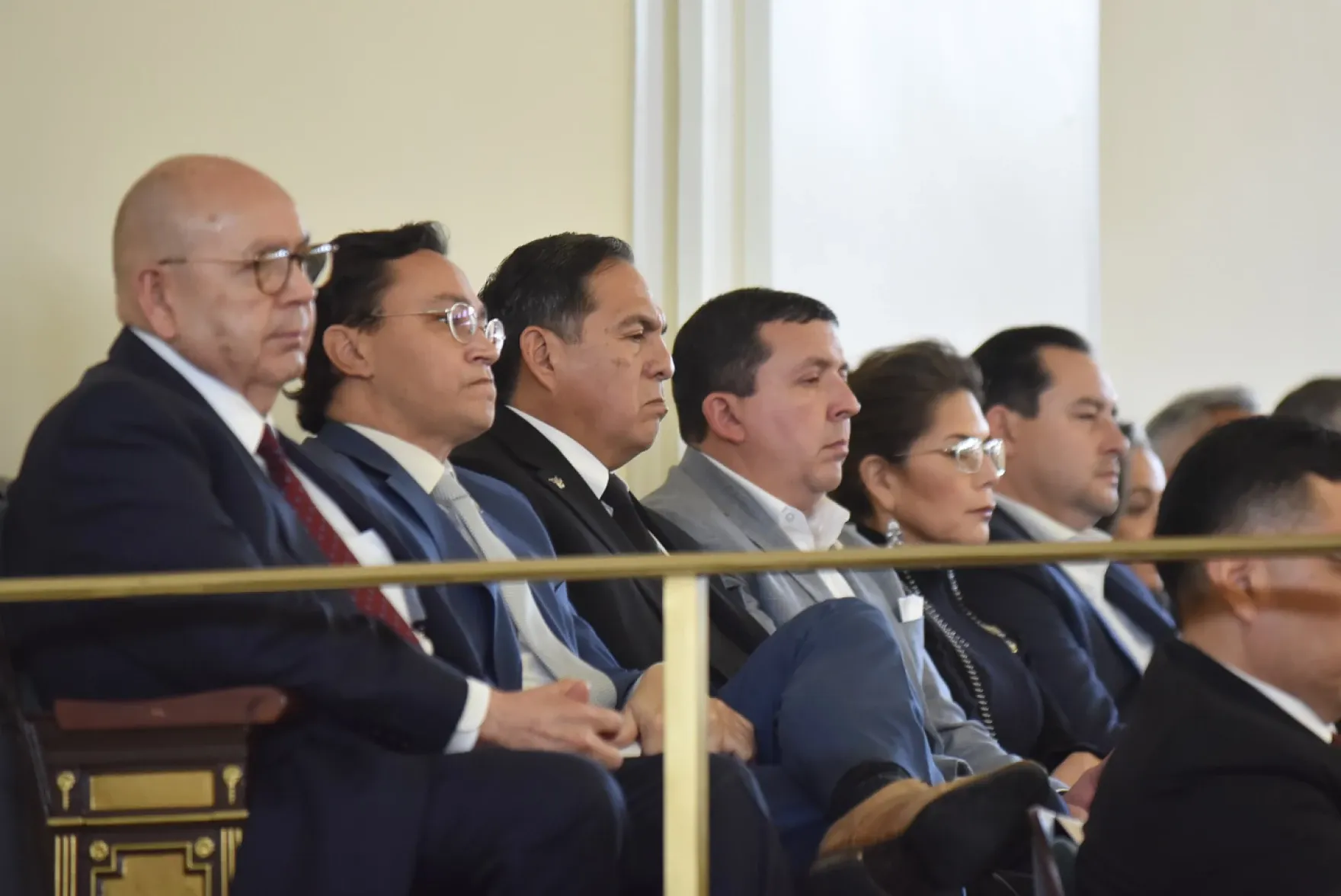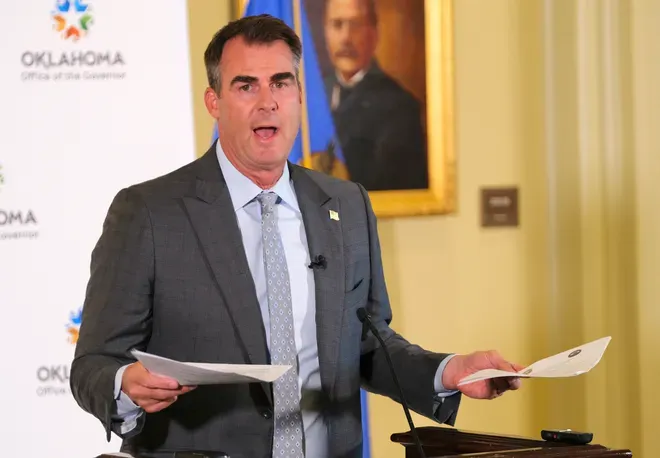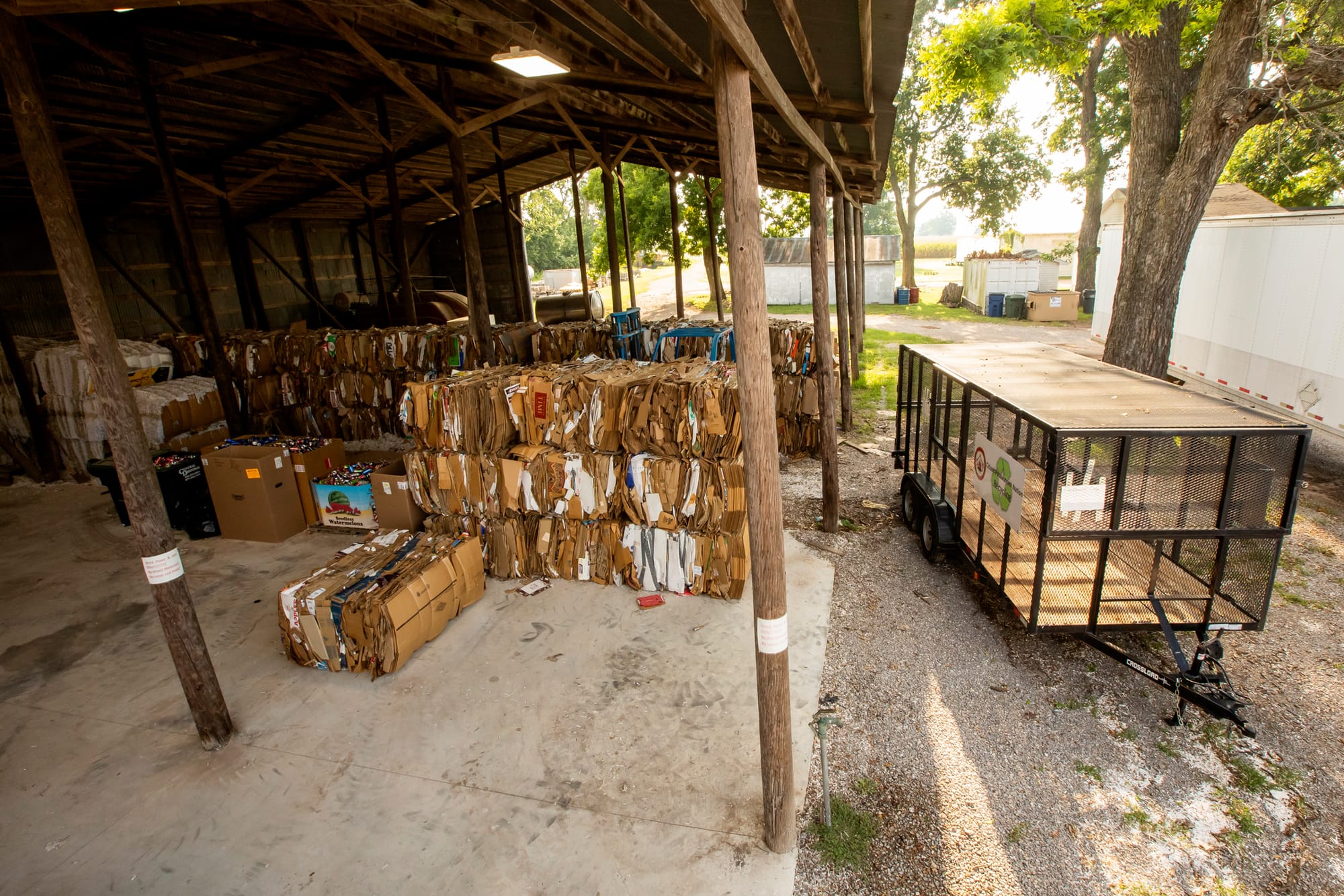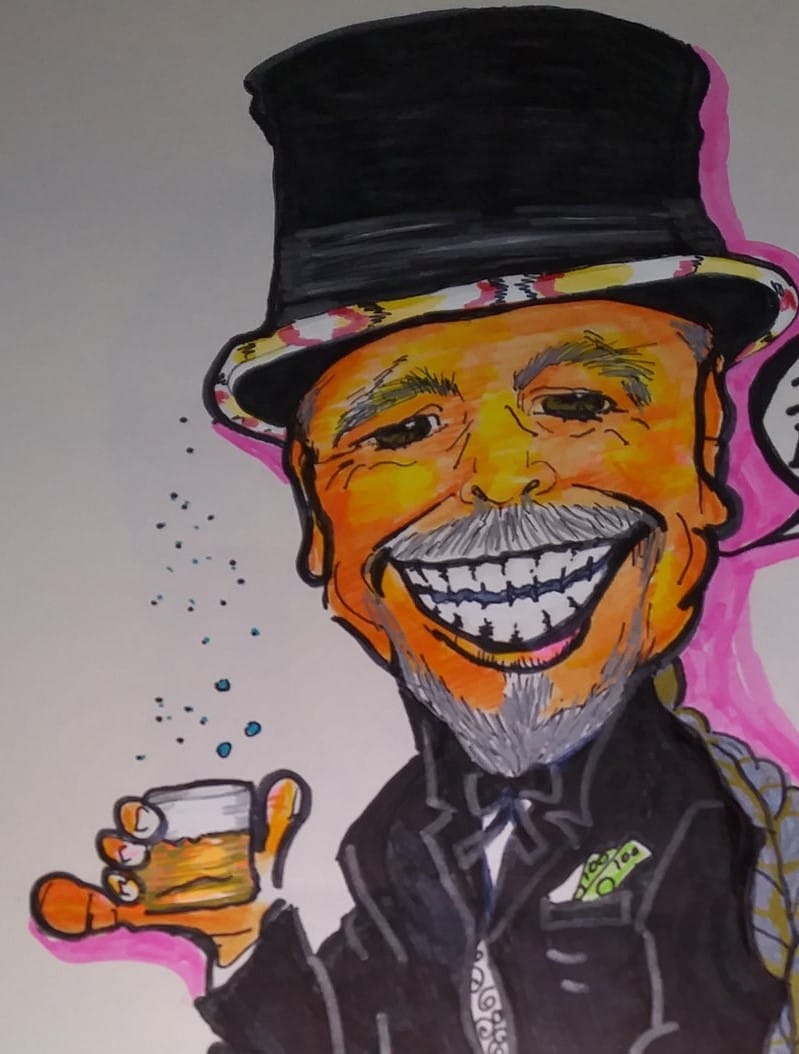

Tribal Nation leaders react following Stitt comments on McGirt, sovereignty

By Lionel Ramos, Graycen Wheeler, Beth Wallis, Anna Pope, KOSU
Stitt said McGirt v. Oklahoma has “rocked our state and caused division where previously there was none.”
Principal Chief David Hill of the Muscogee (Creek) Nation disagreed in a statement he shared after Stitt’s address.
“McGirt has not caused confusion, but political games by politicians like Sitt have,” Hill wrote.
During his speech, Stitt highlighted the One Oklahoma Task Force, which he established in December to address jurisdictional intersections between the state and the tribes, like cross-deputization of law enforcement.
“I hope that this task force can work to find a solution that protects the safety of all 4 million Oklahomans, regardless of their race or heritage, and I hope the tribes will choose to participate,” Stitt said.
But Hill said the task force undermines tribal jurisdiction and hinders law enforcement.
“If the Governor wants to work with tribes, we stand ready,” Hill wrote. “But we will not participate in a political stunt that will make our nations and our state weaker.
Stitt referenced multiple ongoing legal cases over questions of tribal sovereignty. Last month, the Oklahoma Supreme Court heard arguments in a case from Muscogee Nation member Alicia Stroble that could exempt her and other people who live and work within their tribe’s reservations from paying state taxes.
Cherokee Nation Principal Chief Chuck Hoskin Jr. applauded, seemingly in support of Stroble.
But Stitt said tribal members should pay taxes to the state regardless of where they live and work. He compared reservations in Oklahoma to the Navajo reservation in Arizona, where tribal members don’t pay taxes to the state. But Stitt said that’s because Arizona’s state government doesn’t fund infrastructure or law enforcement on the Navajo reservation.
Both Hoskin and House Democrats said that comparison isn’t valid. Hoskin cited tribal investments that help tribal members and non-tribal Oklahomans alike.
“The Cherokee Nation has invested $32 million into roads and infrastructure, contributed more than 7 million to law enforcement and has dedicated over $84 million to public school classrooms, while contributing millions to the economic impact in Oklahoma,” Hoskin wrote in a series of posts the Cherokee Nation shared on X.
The Oklahoma House Democratic Caucus also refuted Stitt’s comments when they addressed the press after his speech.
“Our tribal leaders and tribal nations are great partners with the state of Oklahoma who do invest in public schools, who do invest in roads and bridges, and who do invest in health care,” Munson said. “And so we personally took offense to that because we know of the great work that they're doing across the state of Oklahoma.”
Stitt’s speech celebrated recent compact agreements between the state and several tribes.
“We appreciate the Governor’s comments towards respecting the compacts that were successfully negotiated in recent weeks,” Hoskin wrote. “Now it’s time to extend that same respect towards tribal sovereignty as a whole.”
To read the full article, click on the title.

Everything we know about Oklahoma's tribal compacts, and what Gov. Stitt has signed so far

by Molly Young, The Oklahoman
Oklahoma Gov. Kevin Stitt has become known for rarely working with tribal nations during his five years in office. But in recent weeks, he’s reached a series of agreements with tribal officials that other state leaders view as progress.
Stitt signed off on five compacts with four tribal nations in January. Four of the agreements spell out how the state and each tribe will split tax money generated from tobacco sold on tribal lands. The fifth compact renews Oklahoma’s car tag deal with the Chickasaw Nation.
The governor’s office has said more state-tribal agreements are in the works. You can read all of the new compacts below, as well as a breakdown of the dispute that led up to the deals.
What are compacts?
Compacts are agreements between governments. They are often negotiated to resolve disagreements or clear up questions over power. That could mean the power to collect taxes or the power to regulate, as two common examples in Oklahoma.
What is the controversy surrounding compacts in Oklahoma?
The governor has called many of the compacts unfair. He believes Oklahoma should be making more money under some of the deals — especially the main state-tribal gaming compact approved by voters in 2004. Under that agreement, tribes pay the state monthly fees in exchange for the exclusive right to operate Las Vegas-style gaming in Oklahoma. The payments now add up to $200 million a year.
Stitt wanted Oklahoma to receive a bigger cut of gaming revenues in 2019, but his bid failed. He also tried to arrange an exponential revenue bump for the state when two hunting and fishing license compacts came up for renewal in 2021. Instead, the Cherokee and Choctaw nations cut out Oklahoma altogether and started licensing their citizens on their own.
What about tobacco compacts?
Tobacco compacts came out of 1990s-era legal fights between the state and tribes. Oklahoma officials argued the state should receive the tax money paid by non-tribal citizens buying cigarettes on tribal land.
Compacts resolved the legal disputes. The terms evolved over time to where they are today. The state and tribal nations equally divide the tax dollars collected from tobacco sales on tribal lands.
Why did the tobacco compacts face pushback from Gov. Stitt?
Many tobacco compacts were set to expire by this year. Stitt again pushed for Oklahoma to make more money before renewing them, offering a take it or leave it split of 75-25, according to some tribal leaders. The governor relaxed his proposed split to 50-50 after top lawmakers decided to pass the renewals into law, without Stitt’s approval. That set off a power struggle that continues today.
The governor has insisted on one constant demand. He contends the compacts need to be tweaked to make clear they do not apply throughout entire tribal reservations in eastern Oklahoma.
What’s different in the new tobacco compacts signed by the governor?
The four compacts recently signed by Stitt have a new phrase: “compact jurisdiction.” It’s defined as tribal trust and restricted land, not tribal reservations.
The governor has offered to sign compacts with other tribal nations that agree to that phrasing, he said during a virtual press conference in late January, a recording of which was later viewed by The Oklahoman. He said his general counsel, Trevor Pemberton, was leading the negotiations.
What about the car tag compacts?
The state issues license plates directly to Chickasaw citizens under the terms of a 2014 agreement. The new compact signed by Stitt and Chickasaw Gov. Bill Anoatubby keeps all aspects of the prior arrangement in place.
Only two other tribes, the Cherokee and Choctaw nations, have compacts with the state. Those still need to be renewed.
The governor has said Oklahoma needs more plate compacts because state police and the Oklahoma Turnpike Authority have no idea who is at the wheel of cars with tribal plates. However, The Oklahoman found in November that at least 26 of the 33 tribal nations that issue plates share that information with state police.
Here are the Tribes that signed a compact so far:
Apache Tribe - Tobacco Tax compact
Chickasaw Nation - Tobacco Tax and Car Tag compact
Citizen Potowatomi Nation - Tobacco Tax compact
Wyandotte Nation - Tobacco Tax compact

Tribe’s recycling program six years strong and growing

By: Reid Vishanoff, Citizen Potawatomi Nation Public Information Department
Citizen Potawatomi Nation’s recycling program is funded by the U.S. Environmental Protection Agency (EPA) and was established in 2017 following a four-month waste audit conducted by CPN Department of Environmental Protection.
Waste auditing, explained Micah Isaacs, CPN DEP assistant director, is a fancy term describing what amounts to climbing into dumpsters and sorting through the trash.
“That’s essentially jumping into every dumpster that the Tribe has out here, going through the trash, separating out the different materials in there, and seeing what kind of recyclables and how much the Tribe goes through,” Isaacs explained.
The waste audit process helped the team tailor the program precisely to the Nation’s needs so that it would have maximum benefit to both the environment and the Tribe.
Cardboard, because of its overall bulk and popularity as a recyclable material, proved the most effective and efficient material to start with. The program now processes paper shred and aluminum as well.
Reduces waste, saves money
Environmental Specialist Bryce O’Connor manages the recycling program’s operations, from collection to compacting and baling cardboard, paper and aluminum.
O’Connor makes daily rounds servicing 21 facilities throughout Tribal headquarters, collecting the recyclables.
A facility approximately a half-mile from the FireLake complex houses three compactors, one for each material.
A bale of cardboard can weigh between 500-1,200 pounds, and paper shred can weigh even more.
In its first year, the recycling program diverted 98,400 pounds of recyclable material from landfills. Now, the program diverts roughly 140,000 pounds per year, allowing perfectly usable materials to recirculate and reducing demand on natural resources.
The program also reduces costs to the Tribe.
“You can imagine, just in a small dumpster, … how fast one of those could fill up with cardboard,” Isaacs said. “That thing gets filled up with essentially empty space.”
Solid waste disposal costs the Nation per pickup — that is, every time a disposal truck comes and tips the dumpster. By diverting recyclable materials, especially ones that take up so much space, the recycling program reduces dumpster tips dramatically, saving the Tribe money.
Solid waste pickups at Tribal administration are down to approximately one tip per week, as compared to one per day prior to the implementation of the recycling program. At places like the FireLake Corner Store, the shift is even more dramatic:
“The corner store dumpster would have to be dumped three times a day, I would guess, if that recycling bin wasn’t out there,” Isaacs said.
Support
O’Connor and Isaacs are grateful for the support the program receives throughout the Tribe.
“It’s important to everyone from the top down,” said Isaacs.
Tribal administration has shown tremendous support to the program since its inception, and departments and enterprises were quick to get on board.
“I’ll get calls every day from different departments saying, ‘Hey, can you come get this?’ or ‘Where can I store all this cardboard, because we want to help recycle,’” O’Connor said. “It’s just good to see the community want to recycle and hop on board.”
The recycling program’s reputation so far precedes them that when Sovereign Pipe Technologies, the Nation’s newest enterprise, opened at Iron Horse Industrial Park, SPT staff came to O’Connor to set up a partnership without any prompting.
“Of course, they were on our list to go contact, but when we’re getting a call first, it means that people are aware of what’s going on,” Isaacs said.
Isaacs noted that federal partners, like the Environmental Protection Agency which funds the recycling program, are supportive, and that the program simply would not be possible without the leadership of CPN Department of Environmental Protection Director Shawn Howard.

Looking ahead
In November, the department acquired two new recycling trailers with hydraulic tilt to assist with the collection operations of the program, as well as a new turntable for wrapping the bales of cardboard, paper and aluminum that will further expedite the process.
Proud of the program’s successes to date, O’Connor and Isaacs have one eye turned towards future development for the betterment of the Tribe and the environment.
They hope to further develop hard drive and printer ink cartridge recycling soon, as well as secure document shredding capabilities.
Education and raising awareness are also key missions of the recycling program.
Ultimately, the team hopes to see the impact of the program extend far beyond the day-to-day operations within the FireLake complex.
“I think that’s the most important thing about recycling, period, is being educated on the do’s and the don’ts,” Isaacs said.
From setting up at the annual Family Reunion Festival to connect with Tribal members, to answering calls about how to get involved, O’Connor is especially driven by the educational aspect of his work. Outreach programing will continue to develop as the program expands, he said.
O’Connor encourages readers of the Hownikan to learn about and participate in recycling programs wherever they might be, and he is happy to answer questions that Tribal members might have.
Reach O’Connor at bryce.oconnor@potawatomi.org or 405-878-4929 ex.4283.
Fixico Disrupts Gov. Stitt’s Reservation Task Force

by Fus Yvhikv
As usual, Oklahoma Governor Kevin Stitt thought he was being clever in finding yet another way to stick it to the tribes. As usual, his plan backfired. Will this guy ever learn? Is he capable of learning?
In December 2023, the tyrant Gov suddenly and without tribal consultation, issued an executive order wherein he unilaterally created the One Oklahoma Task Force. The ostensible purpose of the Task Force is to address the “negative effects” of McGirt. McGirt v. Oklahoma is the now three-year-old U.S. Supreme Court decision that properly recognized and restored the reservation status of several tribes in Oklahoma.
Enfant terrible Stitt, holding his Gucci sippy cup, made the announcement at a news conference at the cotton ball white Hickory Country Club in Edmond, OK.
“There must be one Oklahoma,” Bullstitt bellows. “All citizens must play by the same rules guided by the principle of fairness. Therefore this Task Force will be comprised of 13 members with only two tribal representatives.”
The tribes immediately saw through the ruse. Initially, they announced they were boycotting the Task Force. Then they decided to counterattack Gov. Bullstitt by appointing Fixico to the commission.
The Task Force held its initial meeting in early February 2024. The meeting was slated to start at 2pm. Fixico arrives at 2:30pm.
“I’m glad that you could join us,” the commission chairman sarcastically says.
“Stay in your lane, Kemosabe, Fixico replies. “Haven’t you ever heard of Indian time?”
Fixico takes his seat at the large, semi-circular council table. He props his dusty boots up on the table while reclining in his chair. He produces a bag of peanuts and proceeds to shell and chomp them one by one. As he crunches the peanuts a loud popping sound emerges from his mouth and echoes across the room.
“Sir, for the record would you introduce yourself?” the chairman asks.
“Soitenly,” Fixico replies. “My name is Running Late. I’m here to represent and protect the interests of Indian Country from the predatory attacks of this kangaroo court. Uh, I mean Bullstitt’s Task Force.”
“Sir! I greatly resent your characterization of this gubernatorial task force as a kangaroo court,” a commission member yells at Fixico. “And your disrespect of our honorable governor.”
“I call it as I see it. With apologies to kangaroos,” Fixcio replies. “And bulls.”
The commission member angrily approaches Fixico. The two men stand face to face like two boxers in a stare down at a pre-fight weigh in. Fixico crunches a mouthful of peanuts. Debris of the thin, paper-like peanut skin drift from Fixico’s mouth into his opponent’s face. The commission member leans away from Fixico.
“Order! Order!” the chairman shouts as he pounds his gavel. “You two stand down!”
“Brrrrappppp!” Fixico lets fly with a startling loud burp directly in the face of his opponent. Tidbits of gleaming, masticated peanuts adorn the man’s ill-tempered mug.
The task force members and the audience sit in stunned and mute silence. All eyes are on the men. The commission member bull rushes Fixico and puts him in a headlock. He slams Fixico’s face into the large, semi-circular council desk.
“How’s does that feel, Tonto?” the commissioner asks.
“I can’t tell Cracker. How about we try it again?” Fixico taunts.
The commissioner tries to ram Fixico’s face again but loses his footing. Fixico and the commissioner fall onto the desk. Each has their left arm hooked around the other’s neck. They punch each other furiously with their right fists. Locked in mortal combat they roll across the desk and come to a stop next to the chairman. The chairman sits frozen in fear and shock as he holds his gavel.
“Mind if I borrow that, Mr. Chairman?” Fixico asks.
Fixico snatches the gavel and proceeds to pound the commissioner about the head and face. The commissioner loses his grip. Fixico furiously hammers his head while shouting, “Order in the court! I said, order in court!”
Bloodied and battered, the commissioner pushes away from Fixico. He stands with glazed eyes as he slowly sways from side to side. Then he falls to his left like an undercut redwood tree.
“Timberrrrr!” Fixico shouts as the man crashes to the floor with a fleshy thud.
His face adorned with deep purple abrasions and a nose bleed, Fixico stands on the council desk, holds the gavel up high and emits the Creek warrior’s war whoop.
“KOHOHOHOHOHO!”
Fixico stands transfixed in the glory of his war victory. He slowly awakens to the realization that he is all alone in the room. The task force members and audience fled in terror leaving the council chambers looking as disheveled as an Okie yard sale after a tornado.
“This meeting of Governor’s Task Force is hereby adjourned,” Fixico announces with a grin as he pounds the blood-stained gavel. Gov. Bullstitt’s anti-tribe scheme is foiled again.



